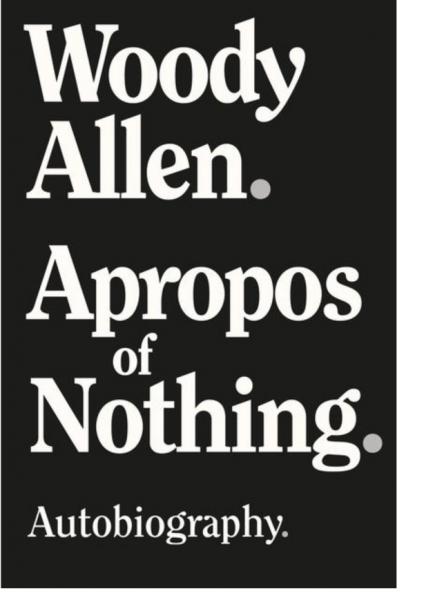Before any review of this book, one first has to confess where they come down on the Woody Allen divide, as it is impossible for that to not color the review, leading to absurd statements like “Woody Allen’s memoir is the most damning indictment yet.” Somehow a book where he defends himself is more damning than the initial accusation, because he thinks Scarlett Johansson is sexy – unlike anybody else.
Woody's pleas of Not Guilty crescendo about halfway through his book, when he discusses his long, non-live-in, unwed relationship with the beautiful, sophisticated Mia Farrow. Woody Allen’s new memoir, Apropos of Nothing, is the book that almost wasn’t published—his first publisher canceled it—and that many people say they don’t want to read.
As a long-standing Woody Allen fan, whose seen every Woody Allen film more than once, even the very bad ones, which are many, I was conflicted. I knew he didn’t “marry his daughter,” but there was too much smoke without fire. And the way he treats his young teenage niece like an adult, dressed like “Annie Hall,” in “Crimes and Misdemeanors” is creepy. A less creepy dynamic is found in “Manhattan,” which is a masterpiece.
No, the more annoying thing in this book is that he may not be a genius, by his own admission, but he is a genius of self-deprecation, driving home again and again that he is not that talented, things just come easy to him, and he is a careless and uncommitted artist. When his films are at their best, this is so obviously untrue that it doesn’t initially speak well of a book that’s supposed to be revealing the truth of his past. It seems like a lie to make him seem personable, disingenuously painting himself as a shade more sophisticated than his character in “Small Time Crooks,” complete with an appreciation of finger bowls.
Apparently, Woody Allen never cares where the camera goes, he just wants to get home in time for the Knicks game. In some cases this is obvious, as there are moments – the beginning of “Whatever Works” or “Café Society” – where actors miss their lines and could obviously use another take. But this is also obviously false modesty or his films wouldn’t be as watchable when they’re good – lighting, costumes, and language are all deeply considered like very few filmmakers; that’s what makes him Woody Allen.
So when in the same breath he mentions that hanging out with Antonioni or other luminary would help tamp down his inflated ego, there is a disconnect. Is he hapless or egomaniacal? His self-deprecation is amusing, even comforting, as he’s seemingly at ease with everything. But that doesn’t totally wash with the portrayal of someone who has trouble entering the front door at parties. He can disavow the quality of “Interiors” or “Shadows and Fog,” now that he knows they weren’t as effective as intended, but the ambition was still there from the start, led in part by arrogance, and there’s little mention of that, barely a mention of reasonable pride. The book seems to only have a superficial interest in how he actually felt, or actually treated people, beginning too many paragraphs with “Anyhow,” like none of it really matters. It does, or he wouldn’t have bothered.
This would seem to be an indictment of the trustworthiness of the entire book, given its other focus. It’s more a disappointment with the book’s tone – his assessment of his own movies and intelligence. If he’s stupid, then what about the rest of us? And he has some strange opinions about his own work. It can be safely, and objectively, said that “Alice” is not better than “Manhattan,” which he never wanted released, but doesn’t get into why.
Only in a world as un-nuanced as this one could Woody Allen skirting over the details of making “Deconstructing Harry” be a signal that he’s guilty of incest, but here we are. On the subject of the allegations against him, he is persuasive, and may just change some minds. He was cleared of any wrongdoing by a panel of experts from Yale, he was allowed to adopt other children, Farrow was abusive of her adopted kids and had a vendetta against him, he thought the allegations were so outlandish that they’d never amount to anything. That last sentence will convince nobody who hates him, but his breakdown of the case is convincing.
In that context, the fact that Hachette dropped the book is especially dispiriting, given it does make such a measured case, and its core focus is about not rushing to judgment. Fortunately, he doesn’t seem to care. He superhumanly isn’t worried about reviews, awards, or criticism about the worst crime imaginable, because he knows what is true. On that front, the book is inspiring.
Anyhow, I’m a fan, more distressed by the lack of detail of his filmmaking process than how he poorly describes women – “kumquats” is bad writing, whatever else – so I’m a particular audience for this book. The book gets better as it goes on, perhaps as his memory got stronger, but it’s page-turning from the start. Just like a bad Woody Allen movie can be entertaining because he’s still like no other filmmaker, this book has a sense of movement and playfulness all its own. It will be mostly enjoyed by completists, but it’s just as recommended for his detractors, which may be unique among autobiographies. Apropos.
Available AtAmazon

Apropos To Nothing
IndieBound

